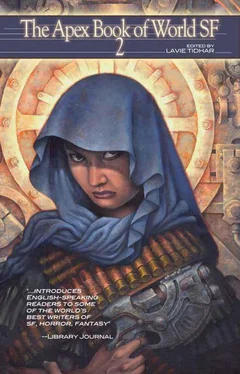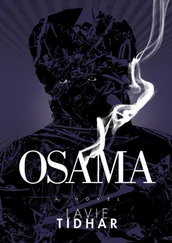Like fairy laughter.
At night, he would sometimes catch glimpses of the wind chimes and the way they drew groups of stray cats who would just sit and watch the glass bits twinkle intermittently under the light of the streetlamps. Or there would be small little moths fluttering close to the wind chimes, drifting like white petals in the breeze.
More letters came from the town council. He shredded them and threw them into the gunnysack designated for recycling. All this happened during the weeks within the Hungry Ghosts Month. He could hear the funeral wakes during the day and, at night, Buddhist chants wafting in the quiet-estate air. Oddly enough, he felt strangely protected and did not worry about hungry spirits haunting his abode. The food and pebbles still appeared as if on schedule and he was grateful for these little gifts.
Cedric. The police are here. We need to go.
Cedric?
Listen…
Can’t you hear them?
The wind chimes are still there, singing in the breeze: still serenading the fairies, still warning of secret dangers.
A Single Year
Csilla Kleinheincz
Csilla Kleinheincz is a Hungarian-Vietnamese writer living in Kistarcsa, Hungary. Besides translating classics of fantasy she works as an editor of Delta Vision, a major Hungarian fantasy publisher. She is the author of two novels and a short story collection. The following story appears in English for the first time in this anthology.
I had learnt love with and for others, so when I met Iván, I almost knew what it was. I was confident enough to make the decision to leave the hospital and move to the country of curry and red plains. I visited my father for the first time in two years to tell him: I am moving to India with someone I met only three months ago, but I wish to spend all the following months to get to know him better.
I didn’t expect his blessing; we never had that kind of father-daughter relationship. Rather, my visit was the work of defiance: I wanted to look into his eyes to prove to myself that I dared. He usually disapproved of my decisions, although he never explicitly forbade anything. He left me to discover the consequences. This time he never even waited for me to finish before he announced that I may not go with Iván. He spoke forcefully, almost like a normal dad would.
“Why not?” I asked and didn’t look away because I had promised myself I would be brave and bear anything he might say.
He didn’t answer at once, but the pity in his eyes jarred my teeth.
“Why not?”
“Because he will die in one year.”
I watched my father, his face covered in grey stubble, his eyes that, even in my childhood, seemed tired—tired and as resigned as the planets that circle on the same route forever and know everything that can be known.
“Are you sure?” I asked. “Do you feel it? Even so, I don’t care what you know.”
“What should I tell you, Judit?” His gaze stole my breath from me. Cassandra must have had the same look as she faced the Troyans.
“Even so,” I said, rising. “Even so.”
I trembled. His study felt cramped.
Then I was standing on the doorstep, looking back. He was sitting in the same hunched pose, clasping his hands in his lap and regarding me with the same insufferable pity. I slammed the door and, in the next moment, was running down the stairs; another blink and I sat in my car, my hand on the ignition key. The time I had left behind caught up with me, swept through me, bringing the flotsam of rage and helpless frustration. I hit the steering wheel, and I couldn’t understand why I hadn’t hit my father instead, when he told me what he shouldn’t have.
For even if I told myself repeatedly, even so, even so , hoping the undulation of words would loosen the knot in my belly, I knew he told me the truth.
Iván will die in one year.
My father was no Cassandra. You had to believe him because he told the truth. We knew that.
Others thought this a gift, but they never knew the man beyond his reputation and they never got their prophecy. I wasn’t even three when my mother left him. As his other women left him later. Not because he wasn’t a good person or a suitable partner; he brought in a good income, he was nice and polite, never even raised his voice. But when his eyes turned to inhuman holes, showing the future, all the women fled. They tried to cope with it but it’s impossible. You cannot live with someone who is sometimes older than the solar system.
I had visited him every two weeks but, as I grew up, it became less and less. After I divorced Gábor, I had taken up talking to my father, first on the phone, bouncing accusations back and forth, then more gently and in person, but once that faraway mist appeared in his gaze, I shied away for months. I didn’t want to let him chip at my life.
You can never really get used to having an oracle for a father. You may forget it for a while, but then something happens to bring forth the strangeness. Often, he didn’t even realise it. I remember once, when I was still in primary school, he stepped onto the crosswalk while the lights were still red. The horns blared crazily but when I held him back, he pulled me with him and said, “Not yet.” He hurried like those who, unlike him, didn’t know the exact time of their death. But his steps were surer. He knew that, until his appointed time, he was invincible. I looked up at him as I would upon a wonder. That passed, too. No big deal in being brave if you know you are invulnerable.
Now I know exactly what Mum must have felt when she took me and left him, finding that my father had ironed and folded her clothes beforehand. She knew she had to break away, but she also wanted to be held back. We all want that deep down inside.
So Mum entered the flat with the prepared words of goodbye on her tongue. The clothes were folded in neat piles on the sofa.
“I saw that he wanted to call me back,” said Mum after my divorce, when we talked about the end of relationships. That time she was more like a friend. Not so much since. “I saw that his heart was breaking; he wanted to hold me back so much, but he knew what would happen and he didn’t even try to change it. I couldn’t forgive him for that for a long time. That he didn’t even try.”
At first, I didn’t understand why my father never attempted to change fate. I tried to pry into it but he always dodged the answer by saying that he didn’t see the future in order to change it, the same as I didn’t control the lives of people I saw on television. After many years, I realised this was the only answer I would get. He cannot change the future just tell it. He wanted me to know that. That was why his girlfriends had left him. That was why I said goodbye to him when, as we were talking, I saw the planets relay to him a sliver of the future. When you cannot fight fate, it is better not to know.
No, this is not entirely true. I asked him many times what he saw. I just stopped asking about Gábor.
As a teenager, I nagged him to tell me if I would pass my exam; would I be a doctor, a pharmacist, a nurse? No, no, yes. It had been a kind of vocational guidance. What could he tell me about Márton? Béla? Attila? When he told me whether the love affair ended in a nice or ugly manner, I realised I didn’t need to know. I shouldn’t know beforehand, never, because it is poison, a permanent ache, a constant search for faults and defects. Why wouldn’t it work? Because of him? Or because of me? Which of us wasn’t enough for the other?
I told my father to keep the messages of the planets to himself. For a while he complied, but I knew from the shadows crossing his face that he saw my future. I pressed my lips together and didn’t ask. Perhaps it was defiance rather than the good sense not to let myself be controlled by my father’s prophecies. I managed to refrain from asking. For a while.
Читать дальше












